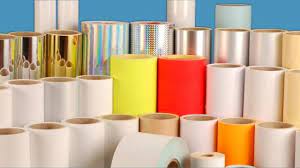When you use the wrong materials and adhesives, you put yourself at a high risk for incorrect, damaged, or missing labels. If your operation must meet certain compliance standards and you could have heavy fines levied against you for unreadable labels, choosing the wrong material can cause misprints and major issues. You can also damage your printing equipment by using the wrong media.
Reduce your total cost of ownership by choosing the correct printer supplies you will get the best results and your hardware will last longer. At Informs, we work closely with a large group of manufacturers and suppliers that respond quickly, like Honeywell.
Here’s a brief guide on the different types of label materials and adhesives available, and how you can determine which is right for your business:
Label Materials
Choosing the right label material makes all the difference when it comes to printing your labels. There are many types of paper and film face stocks available, and each option is best-suited for a specific purpose, print method, and application, so choosing the right option matters.
Common paper face stocks:
- Thermal transfer: This stock is created for printers using a thermal ribbon. The thermal print head heats the back of the ribbon, melting it and transferring the marks onto the label.
- Direct thermal: This is different from thermal transfer in that it is the label, rather than the ribbon, that is heat-sensitive. The print head heats the label, which causes the colors to change.
- Semi-gloss: This material has a sheen to it without looking fully glossy. Labels are printed directly on the semi-gloss paper.
- High gloss: Another paper medium on which labels are directly printed.—the difference being that this paper has a higher shine.
- Laser: This paper label is self-explanatory in that it is meant for printers that use lasers rather than ink to create the image.
- Inkjet: This paper is designed to absorb ink from inkjet label printers and dry quickly to prevent smudging.
Some common film face stocks:
- Polyester: This film is ruggedized for tough conditions and made to resist tears and scratches.
- Polyethylene: This material is more malleable and pliant and is often used for labeling curved surfaces like bottles.
- Polyimide: This heat-resistant film is ideal for electronics and surfaces that may encounter extreme temperatures.
- Polypropylene: This film is the most common and is relatively inexpensive, used for short-term labeling applications.
- Vinyl: This stretchy film offers more flexibility while still being durable enough to be used in outdoor applications.
Label Adhesive
While label materials are an important component in ensuring your labels are printed correctly, the right adhesive is just as important—what good is an accurate label if it can’t stick to the surface it was intended for? There are several different types of adhesives and, like the printer material, each is best suited for a different purpose.
Common label adhesive types:
Permanent: Exactly like it sounds, this adhesive works great for general purposes where a long-term application is needed, however it may not stick well to certain specialty materials and surfaces.
Removable: These labels come in a range of aggressiveness. Some can be removed and replaced over and over, and some can only be removed once or twice. It depends on the application and the purpose.
All-temp: For environments with extreme temperatures, this adhesive is ideal. Cold-temp and freezer label adhesives fall into this category as well.
Aggressive: While “permanent” is well-suited for most applications, sometimes specialty applications call for something stronger, which is where this type is used.
Conclusion:
Choosing the right label material and adhesive will do more than just protect you from fines. The right media can protect your printer from aggressive wear and tear. While this guide can certainly help, it is also worthwhile to speak to your provider about your individual needs. The experts at Informs, Inc. have an extensive knowledge about labeling solutions, materials, and adhesives, and can identify the right options for your unique application.



